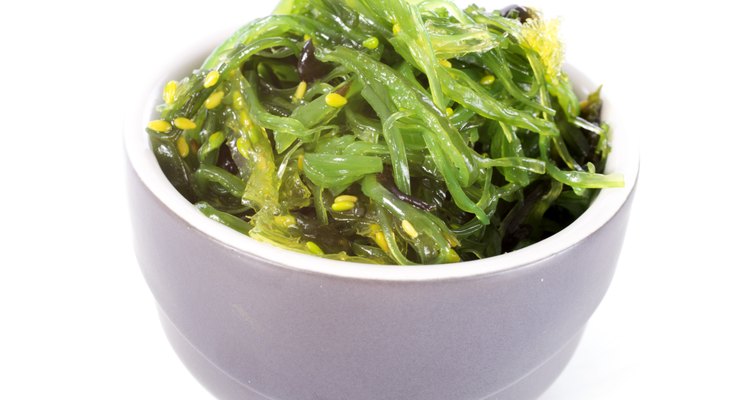
cynoclub/iStock/Getty Images
Sold primarily in Asian markets and health food stores, seaweed still is an enigma to the palates of many Americans. However, adding kelp and other varieties of seaweed to your diet may provide a natural solution to optimize thyroid gland functioning and boost performance in people diagnosed with mild hypothyroidism. Nutrient-packed seaweed contains a rich source of iodine and selenium, two minerals essential to thyroid hormone production.
Iodine and Thyroid Health
Resting on the lower front of your neck, the thyroid is one of the body's most important endocrine glands. Using iodine and the amino acid tyrosine, the thyroid produces thyroxine and thyronine, two hormones that regulate temperature, function and growth of every cell in the body. These hormones also affect cognitive functioning, including concentration and memory. Without an adequate supply, a person may experience fatigue, anxiety and weight gain, according to "Thyroid Power," by holistic practitioners Richard and Karilee Shames.
Iodine-Rich Seaweed
Seaweed is a diverse group of marine plants made from algae that draw nutrients from the ocean. While seaweed produced from brown algae has more iodine than varieties made from red or green algae, all seaweed varieties have significant amounts of the mineral. Icelandic kelp has the highest iodine content. Kombu, arame and hijiki are other good sources of iodine, the Shames wrote in "Thyroid Power."
Selenium-Rich Seaweed
Seaweed also is rich in selenium, a mineral that supports conversion of thyroxine into thyronine, the Shames wrote. Without selenium there would be no thyroid hormone production and conversion, botanist and biologist Ryan Drum wrote in an article on his website, "Island Herbs." The U.S. Food and Drug Administration has recommended 150 micrograms of iodine per day and 55 micrograms of selenium daily.
Adding Seaweed to Diet
Japanese cuisine-inspired soups and grain dishes have incorporated kelp flakes as a salt substitute and seasoning. Dr.Oz.com recommends making your own sushi by putting rice and shredded vegetables of your choice on a nori leaf -- roll it up and dip it in sesame oil or a sauce of your choice.
While seaweed contains numerous nutrients beneficial to the body, be aware that it is extremely high in potassium, containing 34 times more than a banana according to the Huffington Post. Excess potassium can trigger heart arrhythmias, so speak to your physician before adding a substantial amount of seaweed to your diet.
Don't Overdo Iodine
Depending upon the variety, a few ounces of dried kelp can provide almost three times the recommended amount of iodine. According to Phyllis and James Balch in “Prescription for Nutritional Healing," as problematic as an iodine deficiency is, too much dietary iodine can make your thyroid work less effectively. As little as five times the recommended daily amount may inhibit the secretion of the thyroid hormone in some individuals, the Balchs advise.
Related Articles
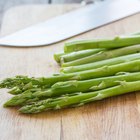
Top Vegetables With Selenium

Zinc Treatment for Rosacea

The Nutrition of 15-Bean Soup
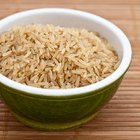
Food Sources of Betaine

Arginine for Hair Growth

L-Lysine for Hair Growth

Chlorella and Hair Loss
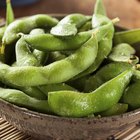
The Nutritional Value of Edamame Beans

Vitamin B6 Dosing for Children
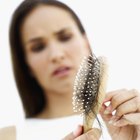
Is Zinc Good for Hair Growth?

Ingredients in Hairfinity Vitamins
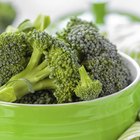
Foods Rich in Magnesium & Phosphorus
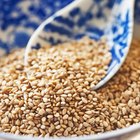
Best Natural Source of Iodine and ...

Basil for Hair Growth
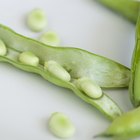
Nutritional Facts of Fava Beans
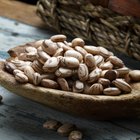
Potassium in Pinto Beans
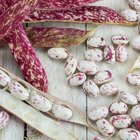
What Is the Nutrition for Cranberry ...

How to Reduce Acne Inflammation

About Seaweed and Hair Growth

Nutrition Information on Blueberries
References
- Thyroid Power; Richard and Karilee Shames
- Dr.Oz.com: Seaweed: Miracle Vegetable From The Sea
- Island Herbs: Medicinal Uses of Seaweed
- Prescription for Nutritional Healing; Phyllis and James Balch
Resources
- Japanese Foods that Heal; John and Jane Belleme
Writer Bio
Cassie M. Chew is a multimedia journalist who covers politics, health care, education policy and technology news for print and online newspapers, magazines and trade press journals. When she's not pursuing a story, Chew enjoys independent film, biographies and books about nutrition and health. She holds a Master of Science in journalism from Northwestern University.
Photo Credits
cynoclub/iStock/Getty Images